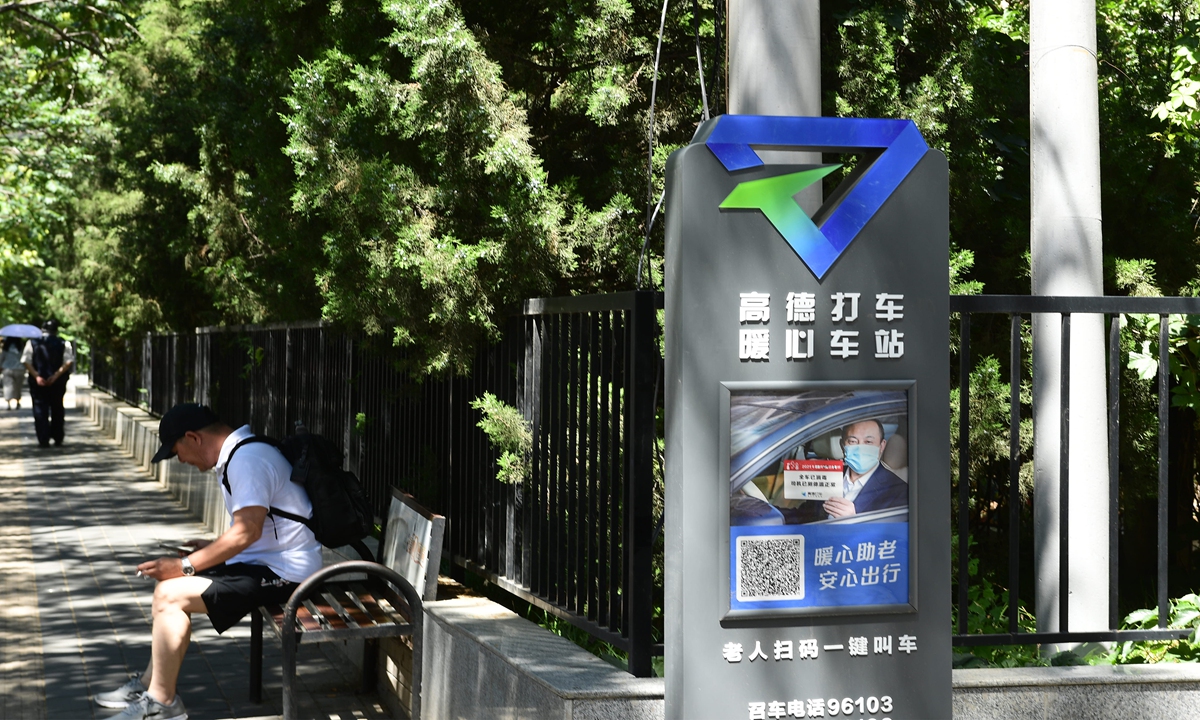
Alibaba-backed AutoNavi, or Gaode Map, set up ride-hailing stations for the elderly to call a car with one click in Beijing on June 19, 2021. Photo: VCG
Some Chinese ride-hailing platforms have become more aggressive over the past two days in promoting their services to drivers and passengers, after China's top cyberspace regulator ordered app stores to remove Didi Chuxing, the dominant player in the industry, over cybersecurity issues.
However, despite the efforts, it would be hard for rivals to chip away at the dominance forged by Didi across the country in a short period, industry analysts told the Global Times.
Several residents in Beijing told the Global Times on Tuesday that they had received push messages from AutoNavi, or Gaode Map, the Alibaba-backed map provider, on their smartphones to invite them to hail rides via its app.
A worker surnamed Yuan said that he began trying new ride-hailing apps like Gaode, and to his surprise, "it offers many options and the response time is quite short."
Gaode launched ride-hailing services in 2017 as a one-stop mobility aggregation platform including services from Didi, high-end Shouqi Limousine & Chauffeur, and Geely-backed Cao Cao Mobility, as well as other operators.
A Shanghai resident surnamed Jia told the Global Times that he received a service call from Meituan Dache (ride-hailing) on Monday, the first day after Didi was barred from registering new users, telling him that the platform would offer a discount as he had used its services frequently in recent times.
As a latecomer, Meituan Dache of Meituan Dianping is probably the most powerful challenger to Didi, an industry insider, who asked to remain anonymous, told the Global Times.
It can integrate ride-hailing services with multiple other online services on the food delivery giant to bring more user traffic, the insider said.
Within 10 days after Meituan launched its car-hailing service in 2018 in Shanghai, it captured one-third of the local market, according to media reports.
Didi's regulatory woe leaves some breathing space for rivals - which took up less than 20 percent of the domestic ride-hailing market together - to catch up by attracting drivers and passengers, analysts said.
"Other platforms' services might go up in the short term, and it is a good sign that they could grow via the opportunity. The country has been reining in industry tycoon's reckless expansion that will harm innovation," Liu Dingding, a Beijing-based independent analyst, told the Global Times on Tuesday.
China's cyberspace regulator said on Sunday that it had ordered app stores to remove Didi, due to confirmed reports of "serious violations of law and regulation" in the collection and use of personal information. The company is also under a cybersecurity review.
According to China's cybersecurity review measures, which were unveiled by 12 government agencies in April 2020, the review could take 45 days, or might even be prolonged for 15 days, if the issue involved is serious.
Although Didi holds the majority share in the domestic 100 billion yuan ($15.47 billion) car-hailing market, there is still huge potential for other players, given rising demand.
According to a report by Analysys, the success rate of domestic car-hailing orders was around 75 percent in 2020, meaning the remaining 25 percent of the orders could not be met.
However, Didi's dominance in the car-hailing market won't be easily upset, based on its oceans of data about drivers, passengers and roads, which has grown into a mature system over the past decade, according to Liu.
Data from Didi showed that it had 377 million annual active users and 13 million annual active drivers in China for the 12 months ended March 31.
A Didi driver surnamed Yang, who's based in Shanghai, told the Global Times on Tuesday that he is worried about whether the Didi app can be used in the future, since he has a deposit in a car rental company that's related to Didi.
"I still want to be a Didi driver in spite of the issues it faces because all the other platforms combined could not offer me half the orders that I can take on Didi," Yang said.
Yang also noted that Didi offers a bonus to drivers who take orders from the platform, a system "that was implemented a long time ago," and he believed that it keeps drivers from shifting away from the platform.
Another Didi driver based in Beijing told the Global Times on Tuesday that she hasn't considered switching to other ride-hailing platforms because Didi has been improving its policies for drivers, including bonuses and lower commission fees.

